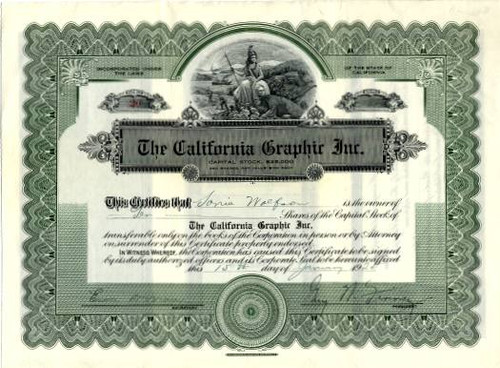Beautiful certificate from the California Pizza Kitchen. This historic document was printed by the Northern Banknote Company and has an ornate border around it with a vignette of the company's logo. This item has the printed signatures of the Company's President, Richard Rosenfield and CFO. 
Certificate Vignette California Pizza Kitchen (NASDAQ: CPKI), known within the food industry as CPK, is a casual dining restaurant chain that specializes in California-style pizza. The restaurant was started in 1985 by attorneys Rick Rosenfield and Larry Flax in Beverly Hills, California, USA. CPK is essentially a mass-market offshoot of Wolfgang Puck's Spago restaurant in Beverly Hills (which in turn was inspired by the Chez Panisse cafe in Berkeley, California). In 1985 the restaurant hired Spago's founding pizza chef, Ed LaDou, to design its menu, and used a similar concept involving an open kitchen centered around a wood-burning pizza oven. It is credited with spreading this once-exclusive California gourmet pizza trend throughout the United States and, later, the world.[citation needed] The chain is widely known for its innovative non traditional pizzas, such as the "Original BBQ Chicken Pizza", BLT, Thai Chicken, and Jamaican Jerk Chicken pizzas. They also serve various kinds of pasta, salads, and desserts. The chain has over 230 locations across 31 states and six countries, including 20 California Pizza Kitchen ASAP kiosks designed to serve passengers at airports and shopping malls. The company has also licensed their name to Kraft Foods to distribute a line of premium frozen pizzas. In 1985, Flax and Rosenfield pooled $200,000 in bank loans and savings along with $350,000 invested from friends to lease space on Beverly Drive in Beverly Hills, California. Almost immediately the restaurant was a success, and the company expanded throughout Southern California. By 1992, there were 26 CPKs. In 1992, PepsiCo paid nearly $100 million for 67 percent of the chain, with Flax and Rosenfield each receiving $17.5 million. At the time this was thought to be more than CPK was worth, and PepsiCo pushed to expand faster. CPK opened 15 stores in the 1993 and 28 in the following year, a plan which was a disaster. PepsiCo had invested tens of millions of dollars in debt on its hands and quickly slowed expansion and moved to cut costs. PepsiCo executives had started cutting corners by replacing fresh ingredients with frozen vegetables and cheese (a change Flax and Rosenfield reversed later). In 1997, the private equity firm Bruckmann, Rosser, Sherrill & Company bought out PepsiCo's two-thirds stake with the intention of taking CPK public in 2000, pushing for expansion to resume. Veteran restaurant executive Fred Hipp was hired to run CPK with an aggressive expansion plan including 18 new stores in 2002, 22 in 2003, and 28 in 2004. Flax and Rosenfield remained on the board but had no day-to-day control. In early 2003, CPK reported a 16 percent increase in profits, with Hipp telling analysts that CPK was in excellent financial condition. In a March 25, 2003 press release CPK cut its first-quarter earnings estimates, which didn't make sense given the positive forecast laid out just a few weeks earlier. Rosenfield investigated the numbers and discovered the positive earnings numbers Hipp had been touting were masking difficult quarters ahead. An emergency board meeting was called, Hipp was fired, and Flax and Rosenfield resumed control of CPK. History from Wikipedia and OldCompany.com (old stock certificate research service).

Certificate Vignette








